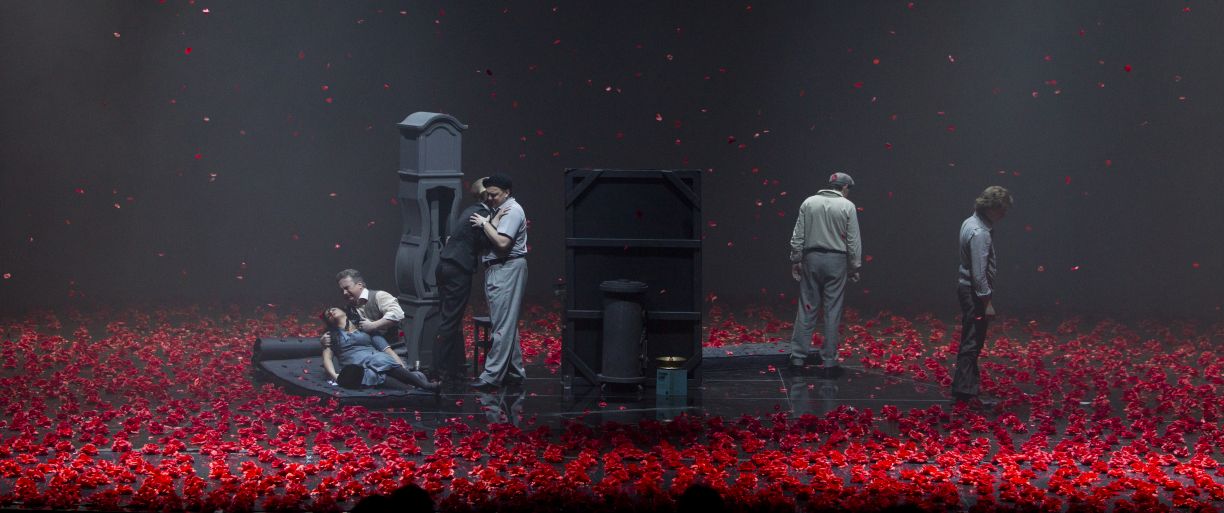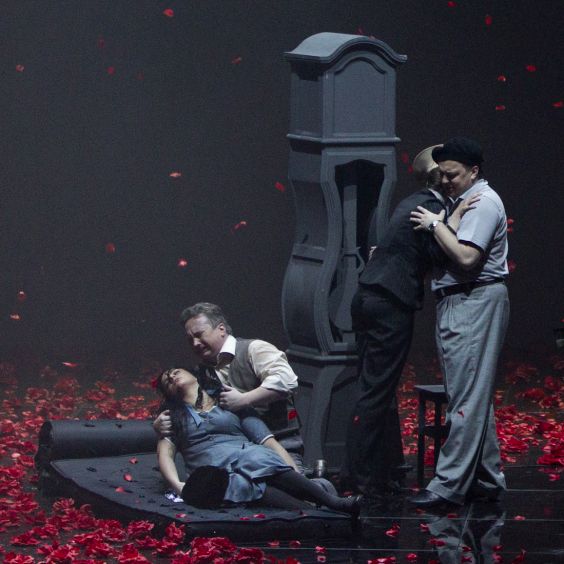La Bohème
opera in four acts
music by Giacomo Puccini
 performed in Italian (with Russian surtitles)
performed in Italian (with Russian surtitles)
Cast
Premiere of the production: 11 May 2011
There are few productions in the world of opera that could compete with this lyrical drama. It is not pretentious, convoluted or emotional — here, the art of opera and the real world collide. It was not by chance that Puccini turned to the only book by Murger that survived its author: The composer knew the protagonists very well: at times, during his studies at the Milan Conservatory, he too had to go without food, just like them. Later, at the time of success and financial independence, he was a centre of the crowd of artists, painters and writers, nicknamed on his initiative ‘The Bohemian Club.’
The composer conceived the idea of the opera in 1893. The opera was created to an Italian libretto by Luigi Illica
Puccini wrote his opera La bohème contemporaneously with Leoncavallo’s own treatment of the same story. The rivalry ended in a quarrel. By the end of 1985 Puccini’s La bohème was ready and received its première on 1 February 1896 in Turin.
Act I
A garret in the Latin Quarter in Paris. Rodolfo and Marcello, a writer and a painter, are trying to work but in vain. They are starving and freezing in their garret. But they never lose their sense of humor. In order to keep warm, they burn the manuscript of Rodolfo’s work. Colline, a philosopher, enters shivering. Then Schaunard, a musician arrives with food, firewood, wine, cigars, and money. The friends cheer up, and when the landlord Benoît comes wishing to collect the overdue rent, the four Bohemians skillfully avoid paying him. Marcello, Colline and Schaunard leave for Café Momus and Rodolfo tells them that he will join them in a while, after he finishes an article he is writing for the news¬paper. Soon after his neighbour Mimì, a poor seamstress, is knocking on the door. Her candle has blown out, and she has no matches; she asks Rodolfo to light it. He is enchanted with the girl. She thanks him, but returns a few seconds later, saying she has lost her key. Mimì tells Rodolfo of her background and her story deeply moves him. They confess their love for each other. On hearing their friends’ voices, they decide to go off and join the others at the café.
Act 2
The Latin Quarter. The group is together amidst a huge crowd that has gathered on Christmas Eve. As the men and Mimì dine at the cafe, Musetta, formerly Marcello’s sweetheart, arrives with a new admirer, the rich Alcindoro. Musetta has left Marcello as she has had enough of the Bohemian life but she’s still in love with him. She’s hoping to reclaim Marcello’s attention but he doesn’t seem to notice her. Musetta is burning with anger for that. To get rid of Alcindoro, Musetta invents a motive to send him off and hugs Marcello. The waiter brings the bill. Schaunard finds out that there’s no money left. Musetta finds the solution: all the charges are put on Alcindoro’s bill.
Act III
In front of an inn on the outskirts of Paris. Early morning. Marcello is working as a painter at the local inn. Mimì has come to see him and tell him of Rodolfo’s jealousy that makes her life unbearable. She coughs all the time. On seeing Rodolfo, she hides and overhears Rodolfo first telling Marcello that he left Mimì because of her coquettishness, but finally confessing that he fears she is slowly being consumed by a deadly illness. Rodolfo, in his poverty, can do little to help Mimì and hopes that his pretended unkindness will inspire her to seek another, wealthier suitor. Her sobs and coughs reveal her presence. Rodolfo tries to console her but now, when she knows his secret, she insists on parting. Mimì and Rodolfo have a moving farewell. The happiness of Marcello and Musetta has also come to an end. The couple quarrel fiercely: Marcello blames her for her coquettishness and they break up.
Act IV
The garret. Several months have passed. Rodolfo and Marcello are trying to work. They talk about their loved ones. Suddenly Musetta arrives: Mimì has also come but she is too weak to get to the garret. The friends bring Mimì in. It’s still cold in the garret. Musetta and Marcello leave to sell Musetta’s earrings in order to buy some food and invite a doctor. Left alone, Mimì and Rodolfo recall their first encounter. The Bohemian company returns with a gift of a muff to warm Mimì’s hands and some medicine. Mimì takes the muff and falls asleep. Rodolfo curtains the window not to disturb Mimì, but his sweetheart is already dead.
Libretto by Luigi Illica and Giuseppe Giacosa based on Scènes de la vie de bohème by Henri Murger
Musical Director of the production: Peter Feranec
Stage Director, Stage and Lighting Designer: Arnaud Bernard
Costume Designer: Carla Ricotti
Artistic Director and Principal Conductor of the Chorus: Vladimir Stolpovskikh
Costume Production Engineer: Alla Marusina
Directors: Yulia Prokhorova, Margarita Kunitsyna‑Tankevich
Chorus Masters: Alexey Dmitriyev, Sergey Tsyplenkov
Pianist and Style Consultant: Richard Barker
Stage Director’s Assistant: Vyacheslav Kalyuzhny
Costume Designer Assistant: Irina Talova
Consultant in the Italian language: Daria Mitrofanova
Artistic and technological visual solutions of the production were developed by the stage technologies studio Show Consulting, St. Petersburg
Stage Design: Dmitry Balashov
Lighting Plot: Gidal Shugaev
The performance feature the Children’s Choir of TV and Radio of St Petersburg
Artistic Director: Stanislav Gribkov
Conductor (Chorus Master): Igor Gribkov
Sets and costumes produced at the Vozrozhdenie Theatrical Design Studios









